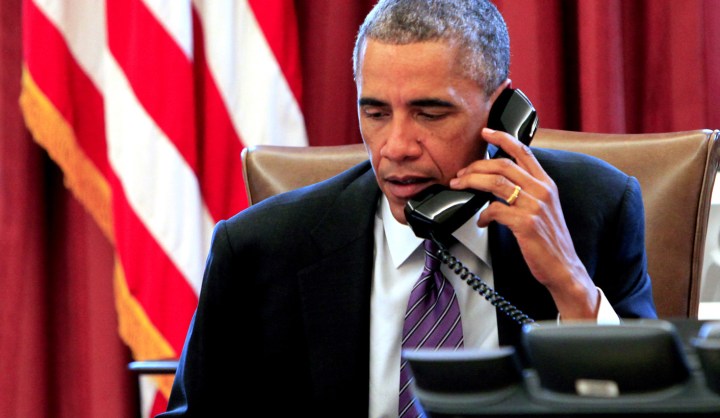World
After Obama’s cruel summer, November could still be the cruellest of them all

If TS Eliot had been an American political pundit instead of a poet, he might well have written that November can be the cruellest month for a Democratic president and party looking for love as the country heads down the home stretch for 2014’s midterm election, especially given all those foreign policy woes. J. BROOKS SPECTOR takes a look.
April is the cruellest month, breeding
Lilacs out of the dead land, mixing
Memory and desire, stirring
Dull roots with spring rain.
Winter kept us warm, covering
Earth in forgetful snow, feeding
A little life with dried tubers…
TS Eliot’s ‘The Wasteland’
Unlike Marc Anthony in his funeral oration for Julius Caesar, maybe it’s time to extend a bit of pity to Barack Obama rather than either praise or castigate him. When he was elected in 2008 he came into office as a near-fatal crisis was eating through the country’s financial vitals. In spite of much second-guessing and criticism, he kept faith with unpopular decisions that helped keep the impending collapse at bay – even though some small investors and home buyers (together with a tottering bank or two that held those sub-prime mortgages) sometimes took it on the chin as well.
Elected in large part to end the American misadventures in Iraq and Afghanistan brought about by the hubris (or worse) of his predecessor’s presidency, those increasingly unpopular military efforts with their nearly unfathomable missions became orderly withdrawals instead under Obama. This largely has remains true even if a modest US military force likely will remain in Afghanistan on into the future.
While the economy has taken some years to revive, and although wage levels continue remain stagnant, according to the standard statistical measures, unemployment has now dropped below 6% –significantly below the levels at the height of the financial crisis. Meanwhile, the federal deficit represents a decreasing share of the country’s GDP, and military spending will be taking an actual cut for years to come. Moreover, despite some IT hiccups and some managerial false steps, the Affordable Care Act is now actually bringing millions of people who had previously fallen outside the security of health insurance into health security.
In foreign policy, throughout his first term of office, Obama garnered high marks by the American population in virtually every public opinion poll. In particular, the successful attack on Osama bin Laden’s hideout and his consequent death was an especially popular event with the public. Still, support for Obama’s foreign policy was rooted in his obvious reluctance to expand foreign military engagement, rather than draw it down, and that would have implications for his choices in 2013-4.
Inevitably, the rest of the world has not been especially kind to the incumbent president as he faces the last two years of his second term. Sorting out the Iranian nuclear puzzle is stubbornly stalemated. Moreover, any realistic hopes for major breakthroughs in the Israel-Palestine standoff are almost certainly receding rather than advancing. Similarly, the US-China dynamic has not really advanced, even as China’s military movement into the Pacific has continued unabated, rattling most other East and South Asian nations. Trade growth has been a major premise of the Obama foreign policy but it has, time and again, all too often, been overwhelmed by all these other crises.
But, of course, worse was still to come. First there was the red line in the sand over Syrian poison gas that came to nothing. Then, there was Russia’s Vladimir Putin’s effort to reassert a 21st century version of the Czarist imperium with its occupation of the Crimean Peninsula and support for rebel insurgents in the eastern part of Ukraine to put more and more pressure on the government in Kyiv.
Then much of the Middle East has now spiralled into further chaos – dragging Obama’s foreign policy reputation along with it. With the quick ascendancy of the Islamic State across the northern half of Iraq and eastern Syria, the collapse of the Iraqi military, and the continuing barbarities by IS against a whole array of religious and ethnic minorities (as well as those international headline-making beheadings of American and British citizens), the entire architecture of the withdrawal of US forces from Iraq (putting aside the original decisions to put them there) has been made increasingly problematic. In short, Iraq/Syria has become a problem for Obama that is now virtually impossible to will away.

Cartoon by Paul Szep.
After weeks of churn in Washington, the president finally pulled together a strategy that included building a coalition of nations from the West, the Persian Gulf, and others like Australia to carry out an air war against IS; providing higher levels of humanitarian assistance to the affected communities; arranging for training for militias who will carry the fight to IS; and interdicting IS’ illicit funding flows and the movement of would-be recruits from the West. What this strategy still requires, of course, is a clearly articulated endgame. The seemingly simple question of what would constitute ‘success’ has, so far, only been expressed in the near-apocalyptic terms of crushing IS – even though that almost certainly will be a task willed onward to Obama’s successor – whoever that is – in 2016. (To be fair, no one else has much in the way of a serious plan, as opposed to fully apocalyptic ones, to bring all this to an end. And this is an especially difficult challenge since American public opinion remains resolutely opposed to placing “boots on the ground” if they have American soldiers’ feet in them.)
Taken together, these foreign policy frustrations have done damage to the “Obama – a successful foreign policy president” refrain. Add to that the unrelenting, poisonous commentary that has emanated from the folks at Fox News, the Bill O’Reilly, Sean Hannity-style crowd, and Republicans in Congress who find nothing to agree with Obama over and everything to oppose. (The old nostrum of “politics stops at the water’s edge” is long gone in American life.) The inevitable result has been a substantial decline in public support for the president, as well as weakening poll numbers about his competence. Such a trajectory has largely come to be the landscape of most presidential second terms and it is probably now inevitability, given the lessened ability of the US to lay down the law internationally.
All of these problems are real enough and many may not actually have an easy solution for any president now. But, of course, the American political process marches on, regardless of the timing of all these international crises. In fact, at this point, the US midterm election is now less than a month in the future.
While the president himself is not facing the voters this time around, at the federal level, a third of the Senate as well as the entire House of Representatives will be. Although Republicans have a majority in the House, Obama’s Democratic Party still commands a slim majority in the Senate. (However many of these Democratic Party members have certainly not voted consistently with the president on many votes – a function of the US political system with loose party leadership structures.)
Throughout most of this election season, Obama has been significantly scarce on the stump in campaigning for Democratic candidates. Many of these candidates – especially incumbents scrambling to be re-elected in what seems Republican weather – have felt their electoral chances would be best served if they positioned themselves as ferociously independently minded candidates who refuse to show signs of political obeisance towards their ostensible party leader. Instead, many of them – if they wanted a political star to campaign with them – have called upon former President Bill Clinton, or even Hillary Rodham Clinton (the increasingly likely presidential candidate in 2016), to help rally the faithful to vote for the candidates. Pollsters have generally been consistent in saying that while the House will stay reliably Republican, the Senate outcome was poised on a razor’s edge – with the likelihood it would go Republican getting ever stronger.
In recent days, Obama has been buffeted by yet more strong winds. Long-time Democratic Party stalwart, Leon Panetta, a former congressman, Clinton’s budget director and then chief of staff, as well as an Obama secretary of defence and CIA director, came out with the latest in early ‘kiss and tell’ memoirs from within the-still-on-going Obama presidency. Panetta’s book followed similar books from Robert Gates, Obama’s first defence head (and a Republican, of course), and then Hillary Clinton’s memoir as well. But Panetta’s book roll-out must have been the one that hurt the worst, given his high visibility appearance and comments on the reliably right wing Bill O’Reilly Show television programme.
All of these things, taken together would seem to be just about the final polishing up of the tombstone for the Obama presidency. But, as the Washington Post’s election watchers noted just the other day, “For months, the 2014 midterm election has looked like a deck stacked in favour of Republicans. But as campaign season heads into its final weeks, some wild cards are now on the table in states where the GOP had been expecting easy victories on its way to gaining six seats for control of the Senate. Election Day may not resolve things, either. If the balance stays as even as it appears now, the question of which party holds a Senate majority may not be resolved until the last ballots are counted — and perhaps recounted — in far-flung precincts of Alaska. Or maybe until runoff elections that could happen as late as January. The latest twist has come in South Dakota, a conservative state with an open seat that had not been on the radar screen as a potential loss for Republicans. All of a sudden, former senator Larry Pressler — elected to that job three times as a Republican but now running as an independent — is closing in the polls with GOP nominee Mike Rounds, a former governor, and leading Democrat Rick Weiland.”
Of course, this being America, many of these races will actually be determined – as they often are – on predominately local or state issues rather than on the broader national ones usually being reported on national news broadcasts. Even the Republicans’ Senate Minority Leader, Mitch McConnell, for example, is now, apparently, in electoral trouble. As the Post added on this score, “Even the year’s marquee contest has not settled down as many expected it to. The most recent Bluegrass Poll in Kentucky has Democratic challenger Alison Lundergan Grimes holding a two-point lead over Senate Republican leader Mitch McConnell. More significant than the margin itself is the fact that the poll shows a six-point gain for Grimes since the last time it was conducted in August.”
In more normal circumstances, a president and party presiding over an economy on an upward trajectory – with unemployment showing monthly decreases, hundreds of thousands of jobs being added monthly, and inflation thoroughly under control – would seem to have positive prospects in an election. Except, that this year, the population seems to have soured widely on the Obama presidency because of a pervasive sense that this president leads rather less than he reacts to circumstances.
Still, there is now a reasonable chance Barack Obama will, once all the races have been decided, face a Congress where both houses are held by his opponents – and thoroughly emboldened ones at that; and that they will be determined to make his last two years in office even more difficult than the previous six ones were. But what would the impact of that be on the 2016 presidential race? From the Republicans’ perspective, their goal would be to stymy the incumbent president, rendering him a kind of pitiful, helpless political giant – Gulliver tied down by all those silken threads.
But in politics there is always an alternative way to look at such things – especially when the future is concerned. With a Congress that is so consistently opposed to the president, this circumstance might just possibly give Obama the incentive to reach back to the Harry Truman playbook, when his 1948 re-election campaign ultimately drew strength in the end as Truman campaigned tirelessly against his Republican Party tormenters, calling Congress the “know nothing, do nothing Congress” that was obstinately holding back passage of any number of the major political and social welfare measures of Truman’s ‘Fair Deal’ manifesto. In that eventuality, Obama and his party – even in the face of Republican obdurateness – could, potentially, set the kind of combative tone needed for a presidential candidate to run successfully in 2016. The Republicans could well find that in an overwhelming congressional victory they have – in the end – sown the seeds of their undoing two years hence. DM
Photo: US President Barack Obama participates in a conference call with state and local officials to discuss his administration’s domestic preparedness response to the Ebola epidemic in West Africa, at the White House, Washington DC, USA, 08 October 2014. EPA/Dennis Brack
For more, read:
-
Late-season surprises shake GOP confidence in Senate elections at the Washington Post
-
The Deficit Is Down, and Nobody Knows or Cares, the Paul Krugman blog at the New York Times
-
Will the president listen to Leon Panetta? At the Washington Post
-
Why Obama Won’t Listen to Leon Panetta – The latest tell-all book channels weak-leadership concerns inside Obama’s own party at the National Journal
-
Paul Krugman’s Obama defence at Politico.com
-
Polling Centre at Politico.com



















